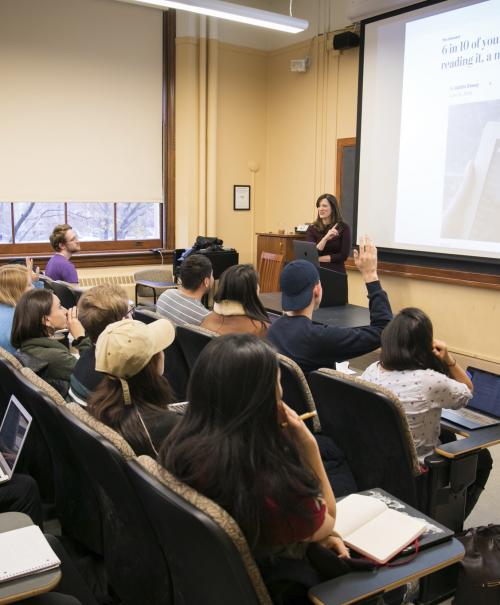Fake news is nothing new. Ben Franklin was notorious for fabricating stories, countries throughout the world have repeatedly engaged in propaganda campaigns, and the current president of the United States has used the term frequently to describe the media. “Post-Truth Politics,” a new class offered this semester by Alexandra Cirone, assistant professor of government, explores the global phenomenon of misinformation.
The class focuses on “fake news” from a comparative perspective, looking at types of misinformation in the U.S., Europe, and in developing countries. Students study the effects of these types of misinformation on behavior, political parties and elections.
One of the topics the class has discussed is free speech, contextualized in reference to the NFL #TakeaKnee movement and conservative speakers on campus. Propaganda has also been a major subject of the class as students screened a North Korean documentary, and also learned how sensational statistics make people fall for fake news and clickbait headlines.
Cirone joined the Cornell faculty in 2018 after receiving her Ph.D from Columbia University in 2017 and spending time as a Postdoctoral Research Fellow in Political Economy at the London School of Economics.
“This is a particularly salient and time-sensitive topic -- not only are individuals encountering misinformation in their daily lives, but strategic misinformation has been used to affect the outcome of recent elections and has been responsible for violence in the U.S. and abroad,” Cirone said.
“There’s also evidence to suggest that fake news is undermining trust in mainstream media. Many students probably don’t know how severe the Russian hacking was, or how dangerous Facebook actually is, or even what the potential solutions to fake news are. This class seeks to discard our misconceptions about misinformation, in order to better assess how it affects politics and how each of us can be more informed consumers of the news.”
One widely discussed phenomenon that the class examined was the idea of “echo chambers,” that people are only seeking out news that confirms their preexisting beliefs. But students learned that this isn’t as common on social media as once thought, because of the relatively diverse media diets of today’s population. Another example of a misconception is the “backfire effect,” where individuals who encounter evidence contrary to their beliefs become more entrenched in their original position. Cirone said this is less of a problem than it once was, because people are open to changing their minds when presented with new information.
Claire Liu ‘19 said the class is one she’s been waiting for during her four years at Cornell. “Topics of mass misinformation and manipulation within the context of politics have always been very interesting to me and actually the basis of my independent major that I am studying through the College Scholar Program,” she said. “Our current political moment alongside our constantly evolving information ecosystems have really introduced these age-old issues in a novel way.”
The course is important not only because it is topical, but also because it is skill based, Cirone said. Students learn analytical writing skills and strategies to make arguments in succinct and persuasive ways. “[Students] also learn foundational skills involving numeracy and critical thinking: correlation is not causation, sensational statistics, logical fallacies — because all of these are important tools by which we assess (and discard) fake news,” she said.
"This kind of class is so important because it teaches critical thinking, and makes students apply that critical thinking to a problem that is happening right now,” Liu said. “....continuously changing and implicating the press, tech and social media corporations, the government, and everyday citizens. The course also touches on subtler acts of manipulation, like deceptive statistics, that I think many people, including myself, have not spent enough class time focusing on.”
Liu said Cirone adds fresh, real-life examples to each of the lectures to show how the phenomenon they are studying in class are playing out in the world. “Our syllabus includes an incredibly well-curated collection of the most important research being done on the topics of modern fake news and mass misinformation more broadly,” Liu said.
Liu also thinks it’s particularly important that the course looks at the topic from a cross-cultural perspective, “which allows students to consider the complexities of navigating similar problems but in political systems really different from what we have in the United States.”




